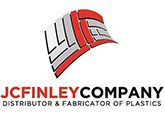Urethane Fabricators
Our ProductsUrethane Fabricators
The team at JC Finley are urethane fabricators specializing in urethane machining, urethane fabrication, and urethane distribution. As a urethane fabricator and urethane manufacturing company, we’ve been providing quality and specialized service to all of our customers in need of urethane. Not sure where to begin? Contact our team to get started. As our saying goes, if you can dream it, JC Finley can make it.
Urethane Attributes
JC Finley’s urethane fabrication products have what’s known as “elastomeric memory” which means that they can absorb shock, flex, and return to their original shape easily (not unlike a rubber ball, for instance). Urethane possesses elasticity qualities more comparable to rubber than plastic while maintaining a strength and durability similar to metal. This combination of qualities give polyurethane substantial shock absorbing qualities as well. Urethane is water resistant and remarkably resilient to impacts (making it a perfect coating for hardwood floors and bowling alleys). Because it comes in varying degrees of hardness and does not wear quickly, urethane components are proven to be viable alternatives to plastic, rubber, and metal. This substantial durability and resistance to wear also make it a favorite material for roller skate wheels and shoe soles.
Urethane Description
Urethane is a synthetic polymer known for its elasticity, durability, and toughness. Generally, urethane possesses qualities similar to rubber rather than hard plastic. Although its stiffness and resiliency make it a favored material for a number of different practical applications.
Now, you may be more familiar with what’s known as “polyurethane” and if you’re wondering the difference, you’re not alone. Despite what the names suggest, there is no difference between urethane and polyurethane. Technically, urethane is a chemical group and polyurethane is a polymer group consisting of many urethane groups. But for all intents and purposes, they are the same and the terms can be used interchangeably.
Because urethane has such a wide variance in terms of hardness, it can be fashioned to virtually any application as a viable alternative to rubber, plastic, or metal. Thermoplastic urethane, however, is substantially more fragile in high pressure applications. Thermoset polyurethane is much better for load bearing applications and has a high resistance to wear. Thermoplastic polyurethane can be re-heated and remolded over and over, whereas thermoset polyurethane cannot.
Thermoplastic polyurethane is excellent in injection or blow molding applications and can be vacuum-formed. Urethane fabricating is also extremely common. Because of their softness as compared to metals and hard plastics, urethane products can be drilled, sanded, turned, and sawed by urethane fabricators with relative ease, making urethane machining a common practice. Of course different grades are easier than others depending on the hardness of the material. With a relatively low melting point and low degree of thermal conductivity, it is all too easy to melt urethane if you do not control the heat in some capacity.
In terms of urethane distribution and sales, urethane is available in cut-to-size sheets, rods, bars, and flexible tubes in ranging thicknesses and diameters. Urethane is also sold in foam forming blocks or in liquid form as sealants or adhesives. For more on urethane distribution or urethane fabrication applications, contact the JC Finley team.
We’re Here To Help Your Business
With Quality, Integrity & Innovation
